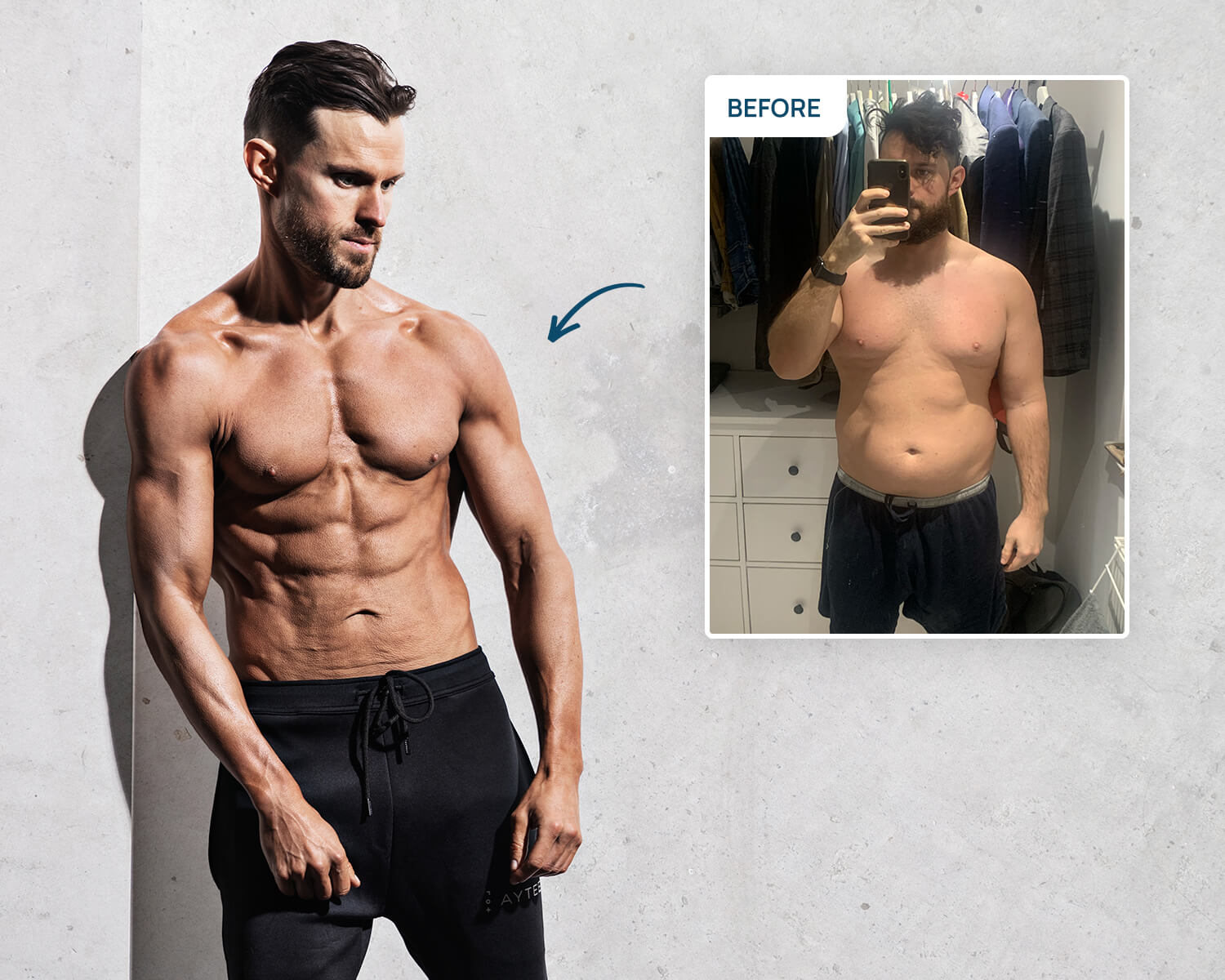Muscle recovery is where progress truly happens. After every workout, your muscles go through a repair process that makes them stronger and better equipped to handle the next challenge.
While light exercise might only need a restful night, intense training sessions, like heavy weightlifting or endurance workouts, can leave your muscles crying out for a few day's rest to repair and rebuild.
However, how quickly this happens depends on a lot more than just the intensity of your workout, and everything from what you eat to how much you sleep can affect how quickly you bounce back.
So give your muscles what they need and learn how to speed up recovery with simple strategies that help rebuild, repair and avoid injuries. With practical tips for speeding up recovery, like active recovery techniques and the best post-workout meals with Frive, you’ll be equipped to reduce soreness, avoid injuries and make every workout count.
How long do muscles take to recover after a workout?
Muscle recovery time varies based on the type of exercise performed, individual fitness levels and the intensity of the workout.
Weightlifting
Engaging in weightlifting causes microtears in muscle fibres, resulting in a recovery period of approximately 48 to 72 hours for adequate muscle repair and growth. Training the same muscle group without sufficient rest can lead to overtraining and potential injury.
Endurance training
Activities like running or cycling involve repetitive, low-intensity muscle contractions. Typically, a 24-hour recovery period is enough for these activities. However, training intensity, duration and individual fitness levels can influence this timeframe.
High-intensity interval training (HIIT)
HIIT workouts combine short bursts of intense activity with rest periods, significantly stressing muscles and the cardiovascular system. A recovery period of 24 to 48 hours is generally recommended, and it is crucial to listen to your body and adjust your rest periods based on your individual body and responses.
Factors influencing recovery duration
Several factors affect muscle recovery times:
- - Muscle size and training intensity: Larger muscle groups and higher-intensity workouts require longer recovery periods due to increased muscle damage.
- - Individual fitness level: Well-conditioned individuals may experience faster recovery compared to beginners, as their bodies are more adapted to physical, exercise-induced stress.
- - Age: As people age, muscle recovery may slow due to changes in hormone levels and tissue repair mechanisms and capabilities.
How long do different muscle groups take to recover?
Recovery times vary among muscle groups due to differences in size, function and usage during workouts. Here's a closer look:
How long do forearm muscles take to recover?
Forearm muscles are engaged in numerous upper body exercises, meaning they are frequently used. After targeted training, they typically require at least 48 hours to recover fully for muscle repair and growth.
How long do leg muscles take to recover?
Leg muscles are larger and usually bear heavier loads during exercises like squats and deadlifts, meaning they’ll need more time to recover. Beginners might experience soreness lasting 3 to 5 days, while those who are more experienced may recover in about 2 to 4 days, depending on workout intensity and volume. Delayed Onset Muscle Soreness (DOMS) often peaks around 12-24 hours post-exercise.
How long do pulled or strained muscles take to recover?
Recovering from a pulled or strained muscle differs significantly from regular post-workout fatigue, as it involves the repair of damaged muscle fibres rather than typical soreness. The recovery timeline depends on the severity of the strain, ranging from mild (Grade I) to severe (Grade III), and the size and location of the injured muscle.
Grade I muscle strains
Mild strains, where only a few muscle fibres are stretched or torn, typically take about 2–4 weeks to heal. These injuries may cause tenderness and pain but generally still allow the muscle to function normally. Rest, gentle stretching and cold therapy can speed up recovery.
Grade II muscle strains
Moderate strains involve a more significant number of torn fibres, resulting in noticeable pain, swelling and reduced strength. Recovery from these injuries takes about 2-3 months and may require physical therapy to restore strength and mobility.
Grade III muscle strains
Severe strains involve a complete tear of the muscle or its tendon, often accompanied by significant pain, swelling and loss of function. Recovery time can range from 6–9 months or longer, especially if surgery is required. Rehabilitation focuses on restoring strength and function gradually over time.
Phases of muscle healing
Muscle recovery follows three overlapping stages:
- - Inflammatory phase (1–3 days) The body responds to the injury with inflammation to remove damaged cells and prepare for repair.
- - Proliferation phase (24–48 hours post-injury, lasting months) New muscle tissue begins to form, and the body activates processes for regeneration.
- - Remodelling phase (starts within weeks, lasting up to a year) Regenerated muscle fibres mature and strengthen.

Find out how Mark changed his exercise regime and lost 30kg thanks to Frive
Factors affecting muscle recovery
Muscle recovery is a multifaceted process influenced by several key factors:
Nutrition
Nutrition is one of the most important elements for muscle recovery. A balanced intake of macronutrients (proteins, carbohydrates and fats) fuels your body with the necessary nutrients to repair muscle fibres and replenish energy stores. Protein in particular is essential for muscle repair, while carbohydrates help restore glycogen levels after a tough workout.
Timing also matters—pre-workout snacks, post-workout meals and even light protein snacks before bed can all support recovery. For example, a high-protein meal after exercise boosts muscle protein synthesis, and research shows that incorporating complex carbs like quinoa or brown rice helps replenish energy effectively.
Frive’s protein-focused meal plans are specifically designed to optimise recovery. Packed with nutrient-dense, chef-crafted meals that include lean proteins, fibre-rich vegetables and healthy fats, they make it easy to fuel your body without the hassle of meal prep.
Hydration
Staying hydrated is essential for keeping your muscles in top form. Proper hydration helps deliver nutrients to your muscles, flushes out waste and keeps everything working smoothly behind the scenes. When you're dehydrated, your body struggles to repair muscle tissue, and you’re more likely to experience painful cramps and fatigue.
Boosting your hydration doesn’t have to mean chugging endless glasses of water. Snack on water-rich foods like cucumbers and watermelon, or reach for hydrating drinks like coconut water to keep your levels topped up.
Sleep
Quality sleep is integral to muscle recovery. During sleep, the body releases the human growth hormone (HGH) that repairs damaged muscle fibres and stimulates growth. However, sleep deprivation can impair these processes, leading to much longer recovery times. Ensuring 7–9 hours of restful sleep per night can significantly enhance muscle recovery and performance.
Fitness level
Your fitness level influences recovery duration. Well-conditioned athletes often experience faster recovery due to physiological adaptations from consistent training. In contrast, beginners may need a longer recovery time as their bodies adapt to new physical demands.
Take a look at Frive's fitness meal prep page to find out more.
Exercise type
Different workouts place varying demands on your body, and recovery times can differ greatly depending on the intensity. High-intensity sessions like heavy lifting or sprint intervals push your muscles harder, causing more micro-damage and calling for longer downtime to repair.
On the other hand, lighter activities like jogging or yoga are gentler on your body and usually need less recovery time. Give your body the rest it needs after intense sessions, and use lighter days to stay active without overloading your muscles.
How can you speed up your muscle recovery?
Learning and using the right strategies is all it takes to speed up recovery, promote muscle repair and keep performing at your peak.
Active recovery
It's probably the last thing you want to do, but engaging in low-intensity activities, such as gentle yoga, walking or swimming, the day after an intense workout can enhance blood flow to muscles, reducing soreness and facilitating faster recovery.
Hot and cold therapy
Switching between hot and cold treatments, like contrast baths or showers, can work wonders for sore muscles. Cold therapy helps reduce inflammation and quite literally numbs pain, while heat therapy loosens up tight muscles and gets your circulation going. Some athletes even swear by cryotherapy—a quick blast of super-cold air—to speed up recovery.
Stretching and foam rolling
Incorporating stretching and foam rolling into your routine can alleviate muscle tightness and improve flexibility. Foam rolling before and after workouts has been shown to enhance performance and help recovery by increasing blood flow to muscles and reducing adhesions in muscle tissues.
Supplements and vitamins for muscle repair
Proper nutrition plays a pivotal role in muscle recovery. Consuming carbohydrates and proteins post-workout replenishes glycogen stores and provides amino acids necessary for muscle repair. Supplements like branched-chain amino acids (BCAAs) may reduce muscle soreness and support recovery.
Additionally, vitamin C, known for its antioxidant properties, can aid tissue repair and reduce muscle soreness, while Omega-3 fatty acids are thought to decrease muscle soreness after high-intensity exercise.
Common mistakes to avoid during muscle recovery
Muscle recovery is as vital as the workout itself. Neglecting recovery can hinder progress, increase the risk of injury and leave you feeling constantly fatigued. Make the most of your fitness journey by steering clear of these most common mistakes.
Skipping rest days
Pushing your body without adequate rest may seem like dedication, but it can lead to overtraining, muscle fatigue and even injuries. Every workout causes micro-tears in your muscle fibres, but rest is when your body repairs and strengthens them. Aim for at least one or two weekly rest days, especially after high-intensity sessions.
Poor post-workout nutrition
What you eat after exercise plays a significant role in recovery. Choosing sugary or processed snacks deprives your body of the nutrients needed for muscle repair. Instead, focus on protein-rich meals paired with complex carbohydrates to replenish muscle glycogen stores and promote recovery.
With options designed for post-workout nutrition, including meals rich in lean protein, fresh vegetables and whole grains, recovering faster and staying on top of your game thanks to Frive has never been easier.
Neglecting stretching and mobility work
Skipping a post-workout stretch might save a few minutes but can leave your muscles stiff and prone to injury. Stretching and foam rolling improve flexibility, reduce lactic acid build-up and support a full range of motion. Incorporating even 10 minutes of mobility work into your routine can significantly improve recovery.
Inconsistent sleep patterns
Sleep is your body’s natural recovery tool and inadequate or inconsistent sleep can disrupt muscle repair, slow recovery and even affect performance. Strive for 7-9 hours of quality sleep every night to ensure your body gets the necessary downtime to rebuild and recharge.
Overtraining without active recovery
Pushing through soreness without active recovery can slow progress and lead to burnout. Active recovery exercises, like gentle yoga, walking or swimming, increase blood flow to your muscles and promote healing. Balance intense workouts with lighter activities to stay consistent without overloading your body.
Overlooking hydration
Dehydration can impair the transport of nutrients and waste removal, leaving your muscles sluggish and sore. Make hydration a priority, not just during workouts but throughout the day, and add water-rich foods or electrolyte drinks into your diet to support muscle recovery after intense sessions.
Consuming alcohol post-workout
Alcohol interferes with the body’s recovery mechanisms by disrupting sleep and slowing muscle repair. While occasional drinks won’t derail your progress, avoiding alcohol immediately after workouts ensures your body can focus on healing and rebuilding.

Find out how Frive Ambassador, Niamh Emerson, incorporates Frive meals as part of muscle recovery
Recover smarter and train stronger with Frive
Muscle recovery is more than just taking a rest day; it combines good nutrition, proper hydration, quality sleep and thoughtful recovery strategies. Understanding how long your muscles need to recover and using techniques like active recovery, stretching, and hot and cold therapy can help your body bounce back faster and stronger.
But what you eat post-workout is just as important as the workout itself. Frive takes the guesswork out of post-workout nutrition with healthy chef-prepared meals delivered fresh to your door. Packed with lean proteins, complex carbs and nutrient-dense vegetables, our meal plans give your muscles exactly what they need to keep you fit and strong.
A great choice for anyone short on time and aiming to level up their fitness journey, check out our high-protein meal plans to take care of your muscles and fuel your recovery.
Take advantage of Frive’s introductory offer today!
FAQs
Is 2 days enough for muscle recovery?
Two days is often enough time for muscle recovery, especially after moderate workouts or for smaller muscle groups. However, recovery needs can vary depending on the intensity of the workout, individual fitness levels and general health. Listening to your body is key—if soreness persists or performance feels compromised, consider giving it extra time.
Is 24 hours enough for muscle recovery?
For lighter workouts or activities targeting smaller muscle groups, 24 hours may suffice for recovery, although intense strength training or high-impact exercises typically require at least 48 hours for optimal muscle repair. Always prioritise rest and assess how your body feels before diving back into intense activity.



